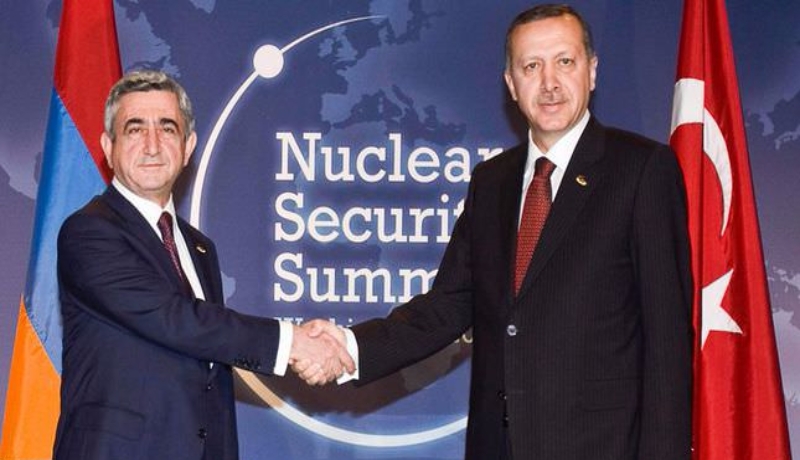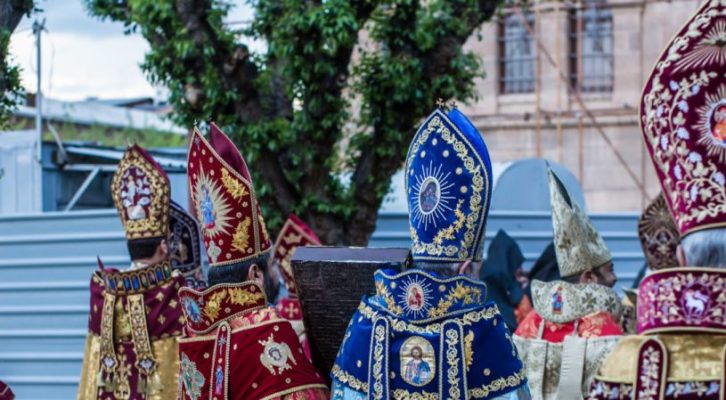Since gaining independence in 1991 Armenia has faced tough challenges in building relations with two of its four neighbors — Azerbaijan and Turkey. Relations with Azerbaijan were mainly influenced by Karabakh conflict. Armenia was supporting Nagorno Karabakh Armenians to defend themselves against Azerbaijani aggression. The end of hostilities in 1994 and the signature of a ceasefire agreement did not bring up peace, and negotiations are still underway, for the last 23 years, to find a mutually accepted settlement.
Turkey recognized Armenian independence in late 1991. In the period of late 1991-April 1993 some border crossing points were operating on Armenia- Turkey border and Turkey was one of the routes for Armenia to receive international humanitarian aid. Nevertheless, Turkey did not establish diplomatic relations with Yerevan. The key factors influencing Turkey’s negative attitude towards Armenia were issues of Armenian Genocide and hostilities in Karabakh.
The authorities of newly independent Armenia did not include international recognition of Armenian Genocide in Armenia’s foreign policy agenda. However, the article 11 of the Declaration of independence adopted in August 1990 stipulated that Armenia supports the process of Armenian Genocide international recognition. The preamble of first constitution of Armenia adopted in 1995 was referring to the Declaration of independence. Turkey was denying the fact of Genocide and describing the 1915 events as mutual massacres between Armenian and Turks. Thus, the demand to Armenia to halt the support to international recognition of Armenian Genocide was one of the cornerstones for Turkey’s policy towards the Armenia.

Photo: Meeting of Armenia’s President Serzh Sargsyan and Turkey’s Prime Minister Recep Tayyip Erdogan on the margins of the Nuclear Security Summit in Washington, April 12, 2010
The second key factor influencing Turkey’s policy was Karabakh conflict. Turkey was fully supporting Azerbaijan’s position and demanding from Armenia to cease its assistance to Karabakh Armenians. In April 1993 Turkey closed Armenia-Turkey border crossing points as a response to the successful Armenian operations in Karabakh. The only acceptable settlement of Karabakh conflict for Turkey was the return to the pre-war situation when Karabakh was an autonomous region within Soviet Azerbaijan. Thus, the Karabakh conflict and Armenian Genocide were key issues determining Turkey’s hostile position towards Armenia. Turkey and Azerbaijan imposed economic blockade on Armenia hoping to force Yerevan to make unilateral concessions on both issues.
Rather than trigger changes in Armenia’s position on Karabakh and Genocide, the Turkish-Azerbaijani joint pressure only compelled Armenia to align itself with Russia to balance the Azerbaijan-Turkey tandem. Not surprisingly Armenia signed the Collective Security Treaty (predecessor of Collective Security Treaty Organization CSTO) in May 1992 and in 1995 the bilateral agreement was ratified on the deployment of Russian military base in Armenia. The August 1997 Armenia-Russia agreement of friendship and mutual assistance fostered cooperation in defense and security spheres. In 2002 Armenia became of the founding members of the CSTO. The absence of relations with Armenia hampered Turkey’s efforts to increase its involvement in the South Caucasus and strengthened Russia’s position.
The situation remained unchanged till 2008 when Armenia and Turkey launched bilateral normalization process with Swiss mediation which resulted in signature of two Turkish-Armenian Protocols — one on establishing diplomatic relations and second on developing bilateral relations – in Zurich in October 2009. The process was supported by the US, EU and Russia with Russian, US and France foreign ministers as well as EU high representative for common foreign and security policy participated in the signing ceremony. It should be noted that Karabakh conflict was not mentioned in Protocols and there were no conditions for ratifying them.
For Armenia, the key asset was the de facto break of Azerbaijani-Turkish tandem. The opening of Armenia-Turkey relations would also play an important role in bolstering Armenia’s economy which suffered from 2008 international crisis with 14 percent GDP decline in 2009. It would also provide more flexibility for Armenia’s foreign policy. Turkey through normalizing relations with Armenia was hoping to gradually increase its influence in the region. This was also part of Turkey’s “Zero problems with neighbors” foreign policy.
The Armenia-Turkey rapprochement was among key US priorities in the region. The US-Russia “reset” launched by Obama administration in early 2009 also supported the process. As for Russia, after the 2008 war with Georgia and recognition of Abkhazian and South Ossetian independence, support to Armenia-Turkish normalization process was a step for Russia to recover its image as a peacemaker in the region. Simultaneously, Russia was sure that Armenia-Turkey relations could not seriously jeopardize its positions in Armenia taking into account the deadlock over Karabakh as well as control by Russian state and state affiliated companies over the key economic assets of Armenia. The only country criticizing the process was Azerbaijan who feared that Armenia-Turkey normalization and opening of borders would weaken Azerbaijani positions on Karabakh and make less likely for Armenia to accept any changes to status quo.
Nevertheless, immediately after signing Protocols Turkey changed its position and put any advance in Karabakh negotiations as a precondition for Protocols ratification. One of the main reasons for Turkey’s behavior could be Turkish domestic politics. The ruling Justice and Development party (AKP) and its leader Prime Minister Erdogan was in need of nationalistic voters in upcoming 2011 Parliamentary elections. The Azerbaijan itself was very effectively playing the nationalistic card developing close ties with Turkish Nationalist Movement party (MHP).
Armenia was ready to ratify Protocols with no preconditions. The Swiss authorities and other international players were supporting Armenia’s approach but with no effect. While Turkey continued to insist on preconditions Armenian President put on hold the ratification process in spring 2010 and in February 2015 recalled Protocols from the Parliament. The upheaval in Turkish domestic politics — Parliamentary elections in June 2015 and snap elections in November the same year, July 2016 failed military coup and extensive purges followed, the polarizing April 2017 constitutional referendum — put Protocols and in general relations with Armenia in backyard of Turkish politics. In recent years the AKP was consistently deepening its cooperation with MHP, whose support played a crucial role in getting necessary votes in Parliament to put draft constitution for Referendum. Another factor hindering any potential move by Turkey on Armenia was growing penetration of Azerbaijani capital into Turkey with Azerbaijan State Oil Company investing billions of USD there. This situation creates more leverage for Azerbaijan to influence Turkish politics.
Given the developments of last 8 years there is no hope for any breakthrough in Armenia-Turkey relations in at least short term (2-3 years) perspective. In his speech at the UN General Assembly on September 19, 2017 President Sargsyan emphasized that the leadership of Turkey were mistaken if it thought that Armenian-Turkish Protocols could be held hostage forever and ratified only at the most opportune occasion from Turkey’s point of view. He mentioned that Armenia would declare those two Protocols null and void and would enter the spring of 2018 without them. Armenia’s vision is clear. Turkey’s behavior with consistent rejection to live up to its obligations only deepens the lack of trust between two parties and can’t be tolerated more.
In April 2018 Armenia will finalize its transition from Semi Presidential to Parliamentary Republic. New Government will be elected by the Parliament and the Prime Minister will assume the main powers of President. Months later Armenia will celebrate 100 years anniversary of creation of the First Republic of Armenia which will bring thousands of influential Armenian Diaspora representatives to Armenia. These events create also domestic policy incentives to be tough on Turkey.
Turkey is facing crucial Presidential and Parliamentary elections in 2019. President Erdogan prepares for its second presidential bid in a polarized country with key goal to keep islamic and nationalistic electorate within its reach. There are no incentives for him to revive Armenian-Turkish Protocols only if any breakthrough achieved in Karabakh settlement process, which itself is very unlikely especially after April 2016 military escalation on the Karabakh-Azerbaijan line of contact.
The recent developments in Syria and Iraq including September 25, 2017 independence referendum in Iraqi Kurdistan put Kurdish issue and geopolitics in the Middle East more broadly in the centre of Turkish foreign policy. Turkey has to deal with growing influence of Kurdish PYD in Syria, which Turkey sees as a branch of Kurdistan Workers Party. The instability in Iraqi Kurdistan after resignation of President Barzani and recent protest movements there due to worsening economic conditions may have destabilizing effect on Turkey’s Kurdish populates areas. In such a geopolitical conundrum, relations with Armenia are not among Turkish foreign policy priorities. The global hot points such as North Korea, the strategic disagreements between Russia and US-NATO-EU on Ukraine, the possible denunciation of Iran nuclear deal by President Trump administration, ongoing Saudi Arabia-Iran rivalry in the Middle East as well as the US decision to recognize Jerusalem as capital of Israel are consuming the most part of external actors’ attention and efforts. It’s less likely that any outside player will have both the will and the capability to exert pressure on Turkey to change its position towards Armenia.
Thus, the most likely scenario will be the continuation of the current status quo with main developments taking place in track two diplomacy formats through different projects bringing together experts and civil society representatives. In a long-term perspective, these developments may create conditions to overcome the lack of confidence between the two societies, which may, in turn, support the re-launch of the normalization of bilateral relations.
Originally published in Stratfor 16/1/2018
Dr. Benyamin Poghosyan is Vice President for Research – Head of the Institute for National Strategic Studies at the National Defense Research University in Armenia holding this position since August 2016 and Executive Director of Political Science Association of Armenia since 2011. In 2013 he was a Research Fellow at the US National Defense University. His primary research areas are geopolitics of the South Caucasus, US – Russian relations and their implications for the region. He joined Institute for National Strategic Studies (predecessor of NDRU) in March 2009 as a Research Fellow and was appointed as INSS Deputy Director for research in November 2010. Before this, he was Foreign Policy Adviser of the Speaker of the National Assembly of Armenia. Dr. Poghosyan has also served as a Senior Research Fellow at the Institute of History of the National Academy of Sciences, and was an adjunct professor at Yerevan State University and in the European Regional Educational Academy. He is the author of more than 40 Academic papers in different leading Armenian and international journals. Dr. Poghosyan is a graduate from the US State Department Study of the US Institutes for Scholars Program on US National Security Policy Making. He holds a PhD in History and is a graduate from the Tavitian Certificate Program on International Relations at Fletcher School of Law and Diplomacy.







